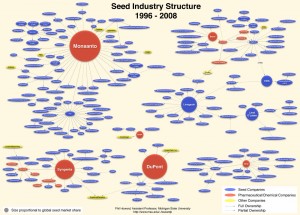editor’s note: In a recently disclosed Associated Press investigative report, Monsanto is being investigated for possible antitrust violations regarding its (seed) business licensing practices by the U.S. Department of Justice and at least two state attorney’s generals. The video below was originally published in February, 2009; the written post has been updated to reflect new information.
In part 2, Claire Hope Cummings raises a number of troubling concerns that are at the heart of what she feels threatens our future food supply, monopoly power.
There are about a handful of global agrichemical companies, and Cummings believes they are threatening the livelihoods of farmers, limiting the range of food choices in the marketplace, and introducing new technologies that pose a threat to agriculture and the environment.
Cummings maintains that their efforts are not in pursuit of noble purpose, to feed the world (as they would like us to believe), but their real intent is the pursuit of power and profit. She emphasizes the point that while Capitalism rightfully rewards risk, these corporations use their monopolistic power to impose their will upon farmers, and thus the marketplace, in the choice of seeds available for farmers to grow; restrict the the reuse of seeds for future harvests; restrict the ability of farmers and scientists to conduct further breeding research; and in other ways that transfer their own risk to others, while continuing to reap giant profits. For further information, see also: The Failure of Science”: New paper makes a damning case against genetically modified food crops, from our friends at the Ethicurean.
Cummings touches upon a wider concern, the loss of integrity and independence of our land grant colleges to conduct scientific agricultural research. Research that used to be intended to serve the public good, according to Cummings, has over several decades, shifted toward serving the narrow commercial interests of private corporations.
Watch the complete series:
- A Conversation with Claire Hope Cummings
- A Conversation with Claire Hope Cummings-Part 2
- A Conversation with Claire Hope Cummings-Part 3
- A Conversation with Claire Hope Cummings-Part 4
Most of the videos featured on Cooking Up a Story were produced, filmed, and edited by Rebecca Gerendasy. Fred Gerendasy contributed as a writer to many of the posts and occasionally as the interviewer. Visit Rebecca Gerendasy Clay – Art and Fred Gerendasy Photography to see their current work.

